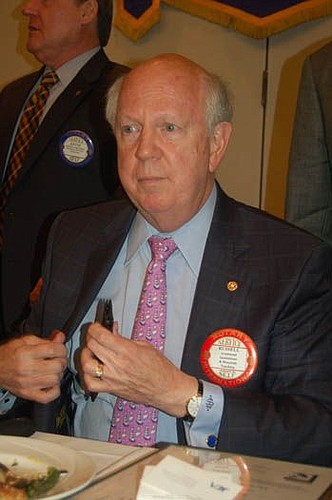
The theme for UF Health Jacksonville CEO Russell Armistead’s presentation Monday to the Rotary Club of Jacksonville was “Why should you care?”
Speaking to his audience of business executives and owners, attorneys and other professionals and more than a few government employees, Armistead said most people who are covered by commercial health insurance don’t get their health care at UF Health.
“There are two payers in health care,” he said. “Insurance companies and the government.”
More than 90,000 patients are treated at UF Health Jacksonville each year. Only 10 percent of the hospital’s patients are covered by private insurance, compared to 40 percent at Baptist Health and 27 percent at St. Vincent’s HealthCare.
The vast majority of people treated at the campus at 655 W. Eighth St. are covered by either Medicare or Medicaid or they have no health care coverage at all.
Armistead said 145,000 people living in Jacksonville are uninsured. In terms of state statistics, Florida ranks second to Texas in the number of uninsured residents.
“We make money on the insured business, we break even on Medicare and we lose money on Medicaid,” said Armistead.
For an average $135 visit to a doctor, a private insurance carrier will pay about $100, Medicare will pick up $73 of the bill and Medicaid will reimburse only $27. UF Health is the only major provider in Jacksonville that accepts Medicaid patients.
“We live on the edge. That’s not new. We’ve been close to bankruptcy forever,” Armistead said.
UF Health spends about $60 million each year treating uninsured patients and receives $26 million from the city to treat uninsured residents. A bill is making its way through City Council committees that would increase the city’s contribution to about $28.8 million.
Armistead said over the years, UF Health has lost $350 million on the contract to provide indigent care, including treating those who are incarcerated.
“It’s a great deal for the city, but not so good for us,” he said.
“If people have no insurance and no money, we are obligated under federal law to treat them,” said Armistead.
That makes UF Health an important provider because if uninsured patients weren’t able to be treated there, they would be going to other area hospitals.
“The other hospitals couldn’t absorb the volume of business we see each day,” he said.
Another reason everyone should care about UF Health, he said, is that it’s the area’s only Level-1 trauma center. That means the hospital’s emergency room is equipped and staffed to treat the most serious injuries from causes such as automobile accidents or violent crime.
Armistead said one of UF Health’s operating rooms is reserved 24/7 for trauma patients.
“If you have trauma, we’re as good as any place in the country. It’s an expensive business and it loses money, but it’s a signature program for us,” Armistead said of UF Health’s trauma care.
On the economic impact side of the issue, UF Health is the seventh-largest employer in the area with more than 3,500 employees and staff. More than 350 physicians participate in the hospital’s residency program and hundreds of medical students, pharmacists and nurses are trained at UF Health.
In addition to the hospital, UF Health operates more than 30 family medicine and specialized primary care centers in Jacksonville, where many patients who have commercial health insurance are treated.
“We’re clean, we’re safe and we’re a place you can count on,” said Armistead.
@DRMaxDowntown
(904) 356-2466